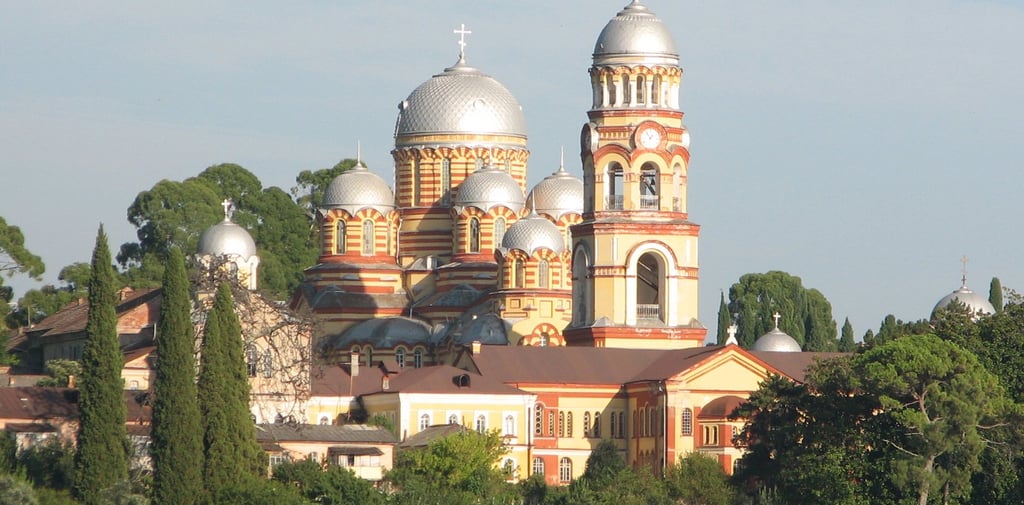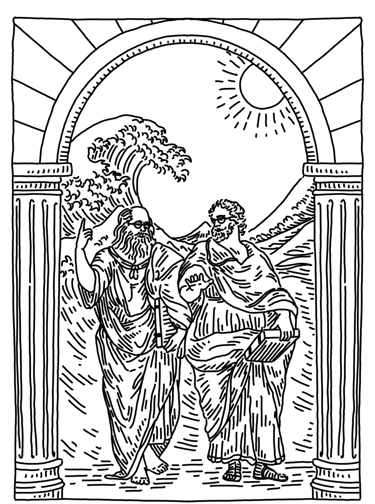Reading Journal : Abkhazia
Results of the Literary Journey through Abkhazia
6/17/2025


Monastery dedicated to Saint Simon the Canaanite, in the town of New Athos (in Georgian: ახალი ათონი; in Abkhaz: Афон Ҿыц).
New Athos is located 22 kilometers from Sukhumi, the capital of Abkhazia.
The Central Event: The War of 1992
The fact is, Abkhazia today is inseparable from its 1992 war of independence, as nearly every book on the region published since then addresses it—either directly or indirectly. I had planned to read two books dedicated to this subject:
Abkhazie (Géorgie), Histoire, politique, culture (Abkhazia (Georgia): History, Politics, Culture), by Jemal Gamakharia and Lia Akhaladzé
Mémoires d'un combattant abkhaze (Memoirs of an Abkhaz Fighter) by Bekir Ashuba.
These two books turned out to be complementary.
The first is written by two professors from the University of Sukhumi—though in fact, Jemal Gamakharia, at the time of the French edition, was Vice-President of the Supreme Council of the Autonomous Republic of Abkhazia. Let there be no confusion: the “Autonomous Republic of Abkhazia” is the name used by the Georgian state, which does not recognize Abkhazian independence, and the University of Sukhumi is in fact located in Tbilisi. In this book, the authors aim to demonstrate that historically, the Abkhaz did not live in Abkhazia, that the region’s culture is primarily Georgian, that the separatists have no legal or factual grounds to claim independence, and finally, that everything is orchestrated behind the scenes by Russia.
The second is the personal memoirs of Bekir Ashuba, a Turk of Abkhaz descent (Turkey is home to between 600,000 and 800,000 Abkhaz, about 3 to 4 times more than in Abkhazia itself). He defines himself as anti-fascist and anti-imperialist, and recounts discovering his Abkhaz origins and culture in his twenties. On July 23, 1992, Abkhazia declared its independence. Ashuba explains that separatists feared losing their autonomy and culture if they were attached to Georgia instead of Russia following the USSR’s collapse. On August 14, Georgia sent 3,000 troops into the region. Ashuba describes how Turkish volunteers, himself included, went to Abkhazia to support the separatist forces.
What about Russia? There is no doubt it sided with the separatists. Abkhazia would maintain ties with Russia, which became the first UN member to recognize its independence, and seems to have remained its military protector. As an aside, the preface of Memoirs of an Abkhaz Fighter was written by a Frenchman named Frédéric Delorca, who praises Vladimir Putin’s involvement in Abkhazia from the 2000s onward...
In short, these books highlight the complexity of the conflict—especially since one issue is either strangely omitted by the separatist perspective or treated ambiguously by the Georgian one: the ethnic cleansing that occurred during the war. The UN and other international institutions acknowledge that this did indeed take place: over 5,000 dead, and between 200,000 and 250,000 displaced persons. The consensus is that these acts were committed by the separatists. Still, in Abkhazia (Georgia)—a strongly pro-Georgian book—some passages suggest that Georgian soldiers may also have committed crimes against civilians.
Reading these books leaves an odd aftertaste, as they approach the subject in a highly biased way, and I don’t feel I understand the situation much better than before. I regret the lack of an objective account that could clearly present the causes and consequences of the war. Especially disappointing is the absence of detailed insights into the separatists’ motivations, who appear almost ex nihilo.
It’s a subject worth digging deeper into.
L'écrivain phare : Fazil Iskander
The Leading Writer: Fazil Iskander
Of the three books I read, two take place in Abkhazia : The Goatibex Constellation and Sandro of Chegem.
Fazil Iskander was indeed born in Abkhazia, grew up there, and even began his writing career there. However, he later settled near Moscow, which is fortunate for us: writing for a Muscovite audience, he goes to great lengths to explain Abkhazian culture. Given that Sukhumi is 1,800 km from Moscow, the cultural differences were likely significant.
Iskander’s writing is particularly notable for its humor: his characters are often comically exaggerated, and you can feel his fondness for comic scenes. This humor also serves a political purpose, as frequent targets include Soviets, Bolsheviks, and Mensheviks.
I particularly recommend reading Sandro of Chegem. Each chapter tells an episode from the life of Uncle Sandro—a life full of adventures, accomplishments, and celebrations across Abkhazia. Sandro, as the best Tamada (a role with no equivalent in France—the Tamada is the toastmaster at banquets; a strong tolerance for alcohol and a hearty appetite are helpful qualifications), often gets the chance to eat: we discover dishes like adjika, mamalyga (a kind of polenta), and khachapuri.
From a literary point of view, some critics have even placed Sandro of Chegem in the magical realism category (The Myth of the Non-Russian: Iskander and Aitmatov’s Magical Universe, Erika Haber, p. 73). As a big fan of magical realism myself, I didn’t find that particular flavor in this book, and it seems Iskander himself had no interest in that genre.
To conclude, it's worth noting that Iskander appears to have distanced himself both from the Abkhaz separatists and the Georgians, criticizing both sides.
In short: don’t hesitate to read Sandro of Chegem. It’s a genuine journey through Abkhazia, which can be followed up with The Goatibex Constellation. The third book, Rabbits and Boas, is better suited to those who already enjoy Iskander’s style—it’s a philosophical tale set in Africa. I greatly enjoyed it, but it provides very little insight into Abkhazia.
Bonus: What Does the Abkhaz Language Look Like?
Just for fun, here’s a sentence in Abkhaz, along with its English translation:
Дарбанзаалак ауаҩы дшоуп ихы дақәиҭны. Ауаа зегь зинлеи патулеи еиҟароуп. Урҭ ирымоуп ахшыҩи аламыси, дара дарагь аешьеи аешьеи реиԥш еизыҟазароуп.
Translation find on Wikipedia :
All human beings are born free and equal in dignity and rights. They are endowed with reason and conscience and should act towards one another in a spirit of brotherhood.
